Module 2 Experiences Unit 3 课件 2023-2024学年外研版八年级下册 (共38张PPT,含内嵌音频)
文档属性
| 名称 | Module 2 Experiences Unit 3 课件 2023-2024学年外研版八年级下册 (共38张PPT,含内嵌音频) | 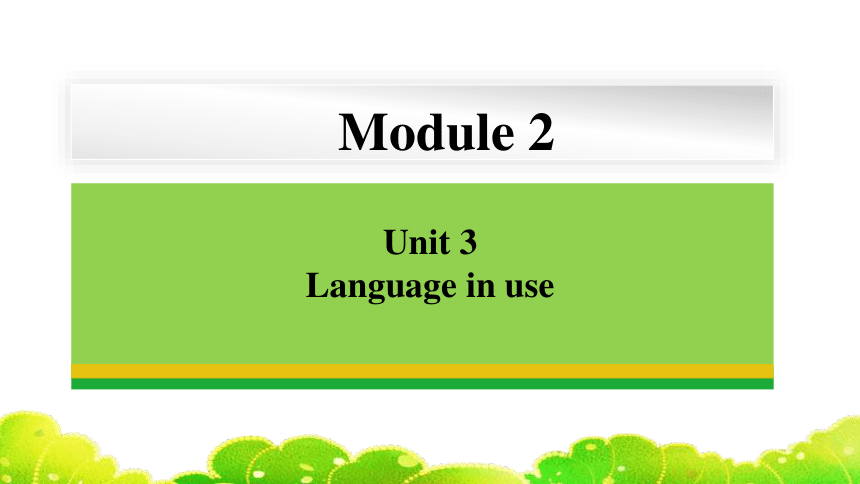 | |
| 格式 | pptx | ||
| 文件大小 | 36.3MB | ||
| 资源类型 | 教案 | ||
| 版本资源 | 外研版 | ||
| 科目 | 英语 | ||
| 更新时间 | 2024-02-19 12:59:41 | ||
图片预览

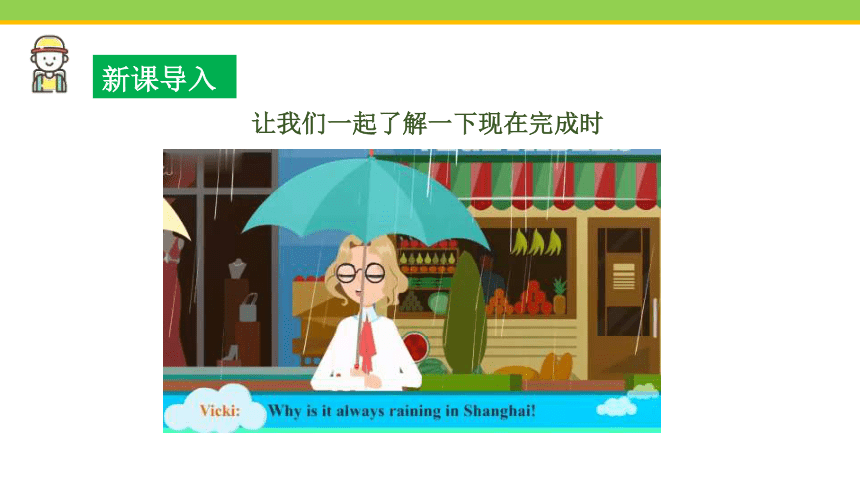
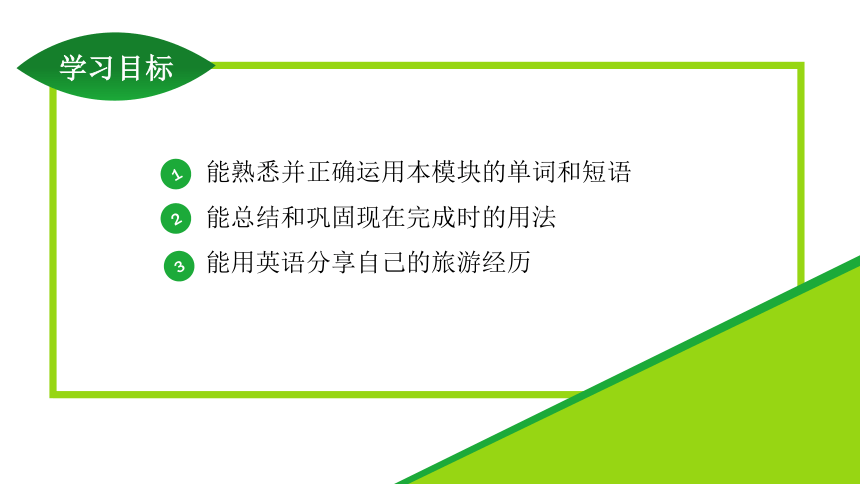
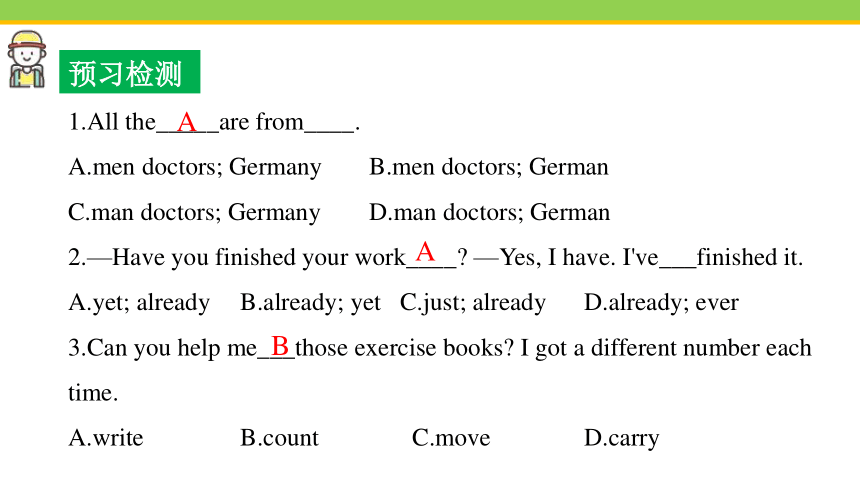

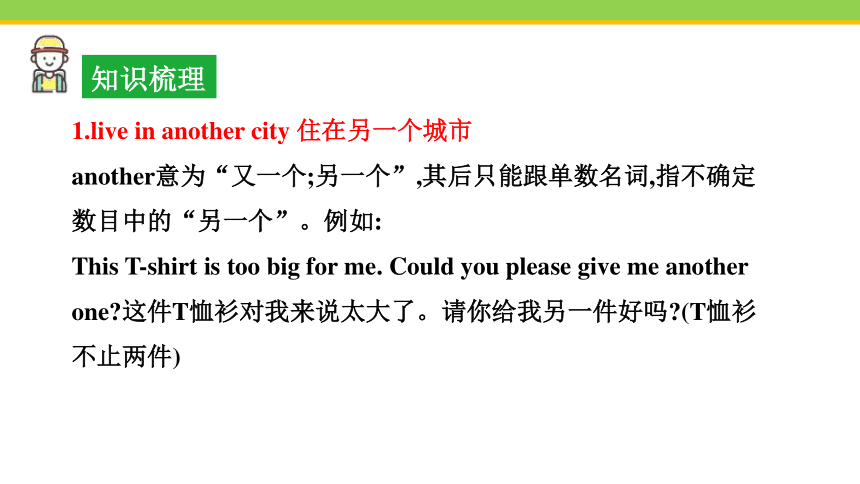
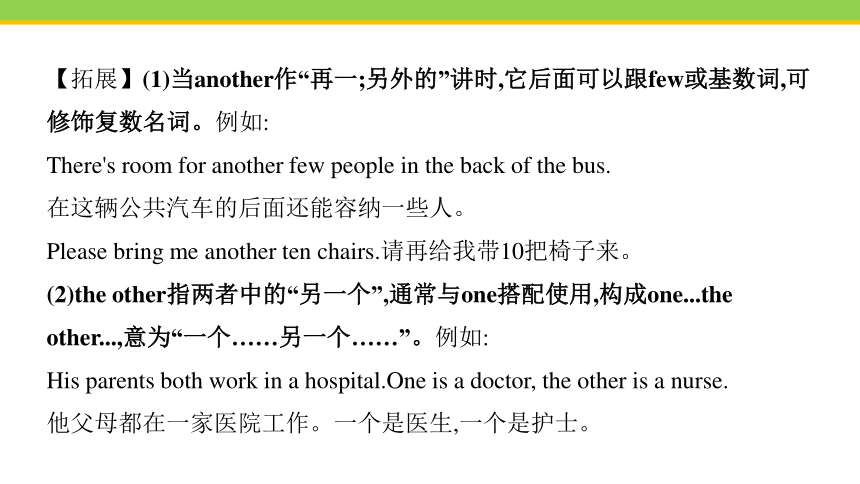
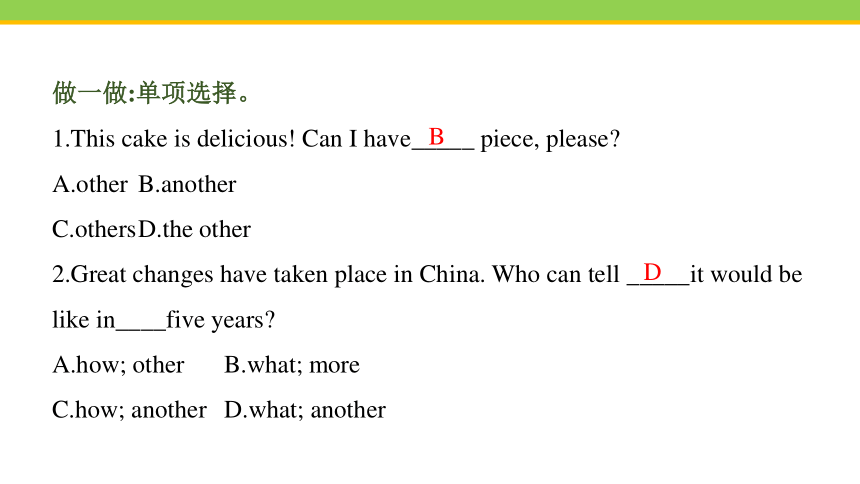
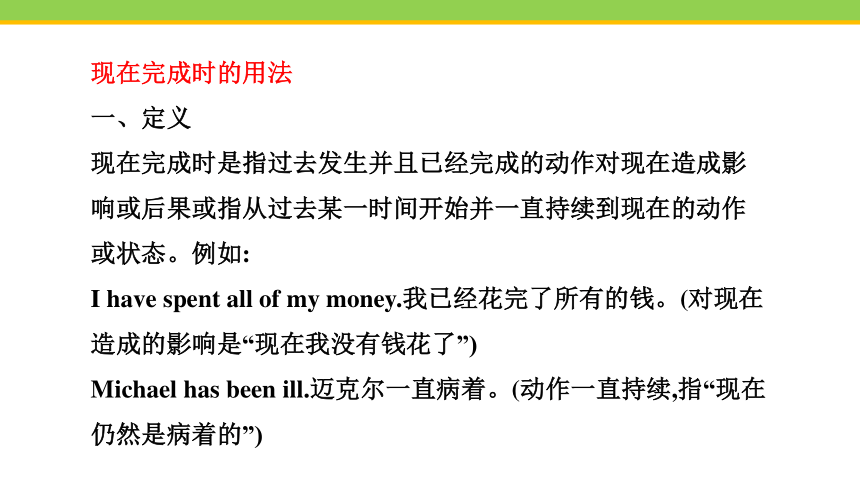
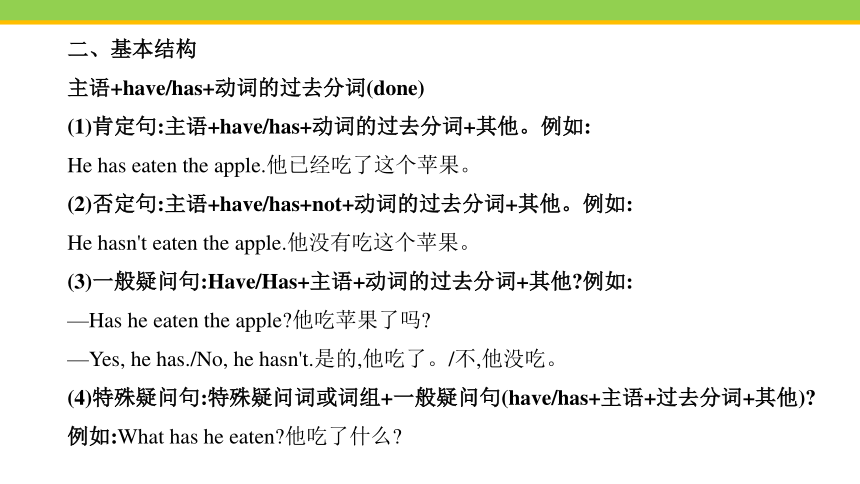
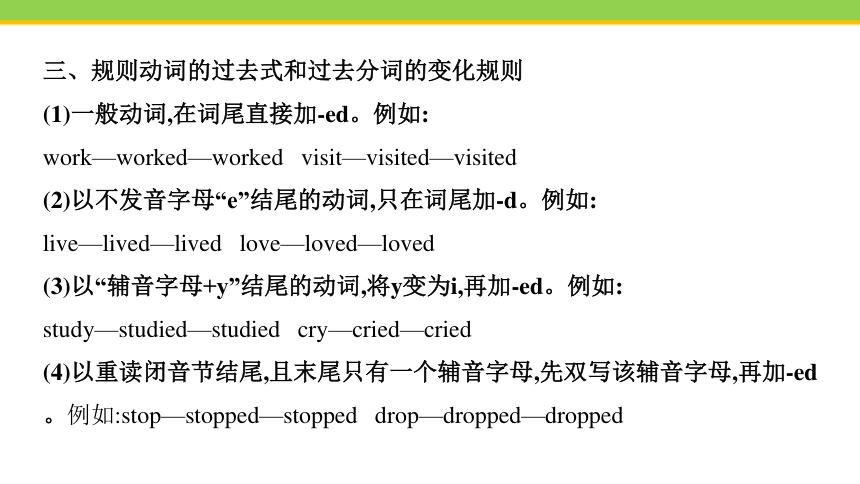
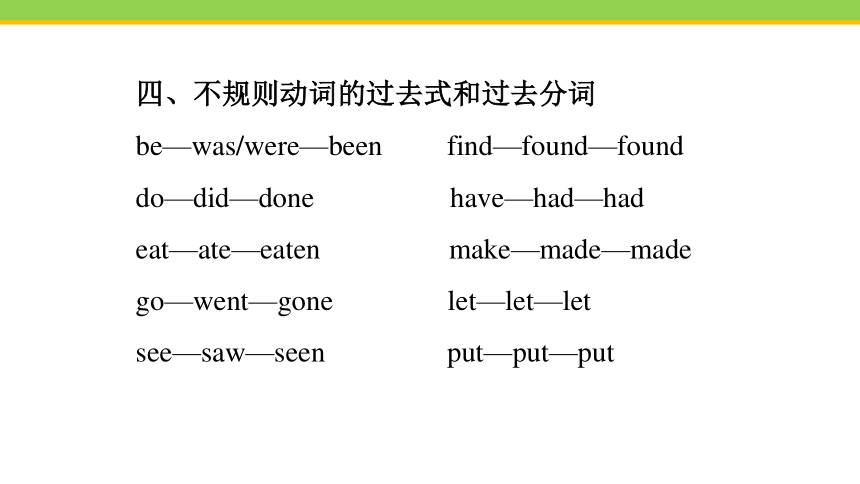
文档简介
(共38张PPT)
Module 2
Unit 3
Language in use
新课导入
让我们一起了解一下现在完成时
1
能熟悉并正确运用本模块的单词和短语
能总结和巩固现在完成时的用法
能用英语分享自己的旅游经历
2
3
1.All the_____are from____.
A.men doctors; Germany B.men doctors; German
C.man doctors; Germany D.man doctors; German
2.—Have you finished your work____ —Yes, I have. I've___finished it.
A.yet; already B.already; yet C.just; already D.already; ever
3.Can you help me___those exercise books I got a different number each time.
A.write B.count C.move D.carry
预习检测
A
A
B
4.—Is Tom at home
—No, he____to the town.
A.has been B.has gone C.goes D.will go
5.I____the History Museum twice. I've learnt a lot there.
A.visit B.am visiting C.have visited D.will visit
C
B
知识梳理
1.live in another city 住在另一个城市
another意为“又一个;另一个”,其后只能跟单数名词,指不确定数目中的“另一个”。例如:
This T-shirt is too big for me. Could you please give me another one 这件T恤衫对我来说太大了。请你给我另一件好吗 (T恤衫不止两件)
【拓展】(1)当another作“再一;另外的”讲时,它后面可以跟few或基数词,可修饰复数名词。例如:
There's room for another few people in the back of the bus.
在这辆公共汽车的后面还能容纳一些人。
Please bring me another ten chairs.请再给我带10把椅子来。
(2)the other指两者中的“另一个”,通常与one搭配使用,构成one...the other...,意为“一个……另一个……”。例如:
His parents both work in a hospital.One is a doctor, the other is a nurse.
他父母都在一家医院工作。一个是医生,一个是护士。
做一做:单项选择。
1.This cake is delicious! Can I have_____ piece, please
A.other B.another
C.others D.the other
2.Great changes have taken place in China. Who can tell _____it would be like in____five years
A.how; other B.what; more
C.how; another D.what; another
B
D
现在完成时的用法
一、定义
现在完成时是指过去发生并且已经完成的动作对现在造成影响或后果或指从过去某一时间开始并一直持续到现在的动作或状态。例如:
I have spent all of my money.我已经花完了所有的钱。(对现在造成的影响是“现在我没有钱花了”)
Michael has been ill.迈克尔一直病着。(动作一直持续,指“现在仍然是病着的”)
二、基本结构
主语+have/has+动词的过去分词(done)
(1)肯定句:主语+have/has+动词的过去分词+其他。例如:
He has eaten the apple.他已经吃了这个苹果。
(2)否定句:主语+have/has+not+动词的过去分词+其他。例如:
He hasn't eaten the apple.他没有吃这个苹果。
(3)一般疑问句:Have/Has+主语+动词的过去分词+其他 例如:
—Has he eaten the apple 他吃苹果了吗
—Yes, he has./No, he hasn't.是的,他吃了。/不,他没吃。
(4)特殊疑问句:特殊疑问词或词组+一般疑问句(have/has+主语+过去分词+其他) 例如:What has he eaten 他吃了什么
三、规则动词的过去式和过去分词的变化规则
(1)一般动词,在词尾直接加-ed。例如:
work—worked—worked visit—visited—visited
(2)以不发音字母“e”结尾的动词,只在词尾加-d。例如:
live—lived—lived love—loved—loved
(3)以“辅音字母+y”结尾的动词,将y变为i,再加-ed。例如:
study—studied—studied cry—cried—cried
(4)以重读闭音节结尾,且末尾只有一个辅音字母,先双写该辅音字母,再加-ed。例如:stop—stopped—stopped drop—dropped—dropped
四、不规则动词的过去式和过去分词
be—was/were—been find—found—found
do—did—done have—had—had
eat—ate—eaten make—made—made
go—went—gone let—let—let
see—saw—seen put—put—put
做一做:按要求完成下列各题。
1.Have you met Mr. Li _____
A.just B.ever C.before D.a moment ago
2.The famous writer_____one new book in the past two years.
A.is writing B.was writing C.wrote D.has written
3.—Your shoes are so old. Why don't you buy a new one
—Because I____my money on an MP5 player.
A.spend B.have spent C.am spending D.was spending
C
D
B
总结和巩固现在完成时的用法
重点探究
1.运用下面方框中给出的动词短语造句,然后结合自己的生活经历,给出回答。
①have a Western meal; ②live in another city;
③enter a singing competition;④travel by train;
⑤travel to the seaside; ⑥try seafood;
⑦cook dinner for your parents
2.结合活动1的表格,小组内两人一组对活动1表格里的问题进行问和答。
Have you ever had a Western meal
Yes, I have./No, I haven't.
3.结对练习,利用上面活动的句型与同伴进行互动,然后请你转述同伴的回答结果。
(1)He/She has ever had a Western meal.
(2)He/She has travelled to another city many times.
(3)He/She has tried seafood.
...
1
Write questions for the questionnaire with Have you ever ...
1) have a Western meal
Have you ever had a Western meal
2) live in another city
Have you ever lived in another city
3) enter a singing competition
Have you ever entered a singing competition
4) travel by train
Have you ever travelled by train
5) travel to the seaside
Have you ever travelled to the seaside
6) try seafood
Have you ever tried seafood
7) cook dinner for your parents
Have you ever cooked dinner for your parents
Activities You Your partner
1 Have you ever had a Western meal
2
3
4
5
6
7
1) He/She ____________________ a Western meal.
2) He/She _____________________ in another city.
3) He/She ______________________ a singing competition.
has/has not ever entered
has/has not ever lived
has/has not ever had
Complete the sentences about your partner and read them to the rest of the class.
3
4) He/She _______________________ by train.
5) He/She ________________________ to the seaside.
6) He/She ___________________ seafood.
7) He/She __________________________ for his/her parents.
has/has not ever travelled
has/has not ever tried
has/has not ever cooked dinner
has/has not ever travelled
Complete the postcard. Use the list of Things to do in Beijing to help you.
see the Beijing Opera√
climb the Great Wall×
eat Beijing duck√
visit the Palace Museum√
4
Dear David,
I’m having a wonderful time in Beijing.I’ve done so many things! I’ve _____________________________________
_____________________________________
There’s only one thing I haven’t done:
_____________________________________
Bye for now.
Rob
seen the Beijing Opera. I’ve eaten Beijing Duck. I’ve visited the Palace Museum.
I haven’t climbed the Great Wall.
5
afford competition pronounce spell tower
1) I wrote a story for a(n) ____________ in my English class and I won a prize.
2) Alice can ___________ very well, and what’s more, she can write beautifully.
pronounce
competition
Complete the sentences with the words in the box. You can use some of the words more than once.
3) Some English words are difficult to ________________.
4) We visited an ancient palace with a tall ________ and a beautiful garden.
5) Mary wants to visit the US, but the plane tickets are very expensive and she cannot ________ to go.
afford
tower
pronounce/spell
afford competition pronounce spell tower
People China the US
Winnie
Diana
Bob
Listen and check (√) the country that the people have been to.
√
√
√
6
Listen again and answer the questions.
7
1. How many times has Winnie been to the US
2. Which country would Diana like to go again
3. Which part of China has Diana travelled around
4. How did Diana travel there
5. Has Bob ever visited Germany
1. How many times has Winnie been to the US
2. Which country would Diana like to go again
3. Which part of China has Diana travelled around
She has been to the US three times.
She would like to go to China again.
She has travelled around South China.
4. How did Diana travel there
5. Has Bob ever visited Germany
She travelled there by train.
Yes, he has. He’s been all over Europe.
Call today to find out more!
Then we will send a gift box from you to your family or friend.
A tree is also something special for a festival or a new baby.
Have you ever been to a forest
Grow a tree near you!
Complete the passage with the sentences in the box. There is one extra sentence.
8
Grow a Forest!
(1) _____ Have you ever wanted to save the trees in the forest Do you love nature and want to keep forests safe Now you can! Buy a tree – it is the perfect birthday or wedding present for someone in your family or for a friend. (2) ____ Your tree will help our world and will last longer than toys, clothes or computers.
d
c
The world needs more trees — buy one today, watch it grow bigger and feel proud!
The Grow-a-Forest gift is part of an exciting plan to make our world greener, and every gift helps to protect our world. It is easy! Buy a Grow-a-Forest gift today and choose your forest and your tree. We will take it and put it in the earth for you. (3) ____
b
In your gift box there will be:
a map of the forest
a photo of your tree
a pair of Grow-a-Forest gloves
a card with your message to your family or friend
(4) ____
e
通过以上活动,我们知道现在完成时基本结构:
________________________________________________________________________________________________________________________________________________________________________________________________________________________________________________
(1)肯定句:主语+have/has+动词的过去分词+其他。
(2)否定句:主语+have/has+not+动词的过去分词+其他。
(3)一般疑问句:Have/Has+主语+动词的过去分词+其他
(4)特殊疑问句:特殊疑问词或词组+一般疑问句(have/has+主语+过去分词+其他)
活动小结
当堂检测
1.It is a_______(梦想) of mine to go to Disneyland.
2.The building is taller than that_______(塔).
3.We ______(数) the books in the room and found some missing.
4.She can't______(负担起)to pay for such a long holiday.
5.This is my new classmate. He is from_________(德国).
一、根据句意及汉语提示填写单词。
dream
counted
tower
afford
Germany
现在完成时基本结构:
(1)肯定句:主语+have/has+动词的过去分词+其他。
(2)否定句:主语+have/has+not+动词的过去分词+其他。
(3)一般疑问句:Have/Has+主语+动词的过去分词+其他
(4)特殊疑问句:特殊疑问词或词组+一般疑问句(have/has+主语+过去分词+其他)
本课时重要词汇:
ever,enter,competition,prize,dream,afford,
invite,move,send,Germany,France,tower,ancient,king,queen,way,mix,count
Module 2
Unit 3
课堂总结
Module 2
Unit 3
Language in use
新课导入
让我们一起了解一下现在完成时
1
能熟悉并正确运用本模块的单词和短语
能总结和巩固现在完成时的用法
能用英语分享自己的旅游经历
2
3
1.All the_____are from____.
A.men doctors; Germany B.men doctors; German
C.man doctors; Germany D.man doctors; German
2.—Have you finished your work____ —Yes, I have. I've___finished it.
A.yet; already B.already; yet C.just; already D.already; ever
3.Can you help me___those exercise books I got a different number each time.
A.write B.count C.move D.carry
预习检测
A
A
B
4.—Is Tom at home
—No, he____to the town.
A.has been B.has gone C.goes D.will go
5.I____the History Museum twice. I've learnt a lot there.
A.visit B.am visiting C.have visited D.will visit
C
B
知识梳理
1.live in another city 住在另一个城市
another意为“又一个;另一个”,其后只能跟单数名词,指不确定数目中的“另一个”。例如:
This T-shirt is too big for me. Could you please give me another one 这件T恤衫对我来说太大了。请你给我另一件好吗 (T恤衫不止两件)
【拓展】(1)当another作“再一;另外的”讲时,它后面可以跟few或基数词,可修饰复数名词。例如:
There's room for another few people in the back of the bus.
在这辆公共汽车的后面还能容纳一些人。
Please bring me another ten chairs.请再给我带10把椅子来。
(2)the other指两者中的“另一个”,通常与one搭配使用,构成one...the other...,意为“一个……另一个……”。例如:
His parents both work in a hospital.One is a doctor, the other is a nurse.
他父母都在一家医院工作。一个是医生,一个是护士。
做一做:单项选择。
1.This cake is delicious! Can I have_____ piece, please
A.other B.another
C.others D.the other
2.Great changes have taken place in China. Who can tell _____it would be like in____five years
A.how; other B.what; more
C.how; another D.what; another
B
D
现在完成时的用法
一、定义
现在完成时是指过去发生并且已经完成的动作对现在造成影响或后果或指从过去某一时间开始并一直持续到现在的动作或状态。例如:
I have spent all of my money.我已经花完了所有的钱。(对现在造成的影响是“现在我没有钱花了”)
Michael has been ill.迈克尔一直病着。(动作一直持续,指“现在仍然是病着的”)
二、基本结构
主语+have/has+动词的过去分词(done)
(1)肯定句:主语+have/has+动词的过去分词+其他。例如:
He has eaten the apple.他已经吃了这个苹果。
(2)否定句:主语+have/has+not+动词的过去分词+其他。例如:
He hasn't eaten the apple.他没有吃这个苹果。
(3)一般疑问句:Have/Has+主语+动词的过去分词+其他 例如:
—Has he eaten the apple 他吃苹果了吗
—Yes, he has./No, he hasn't.是的,他吃了。/不,他没吃。
(4)特殊疑问句:特殊疑问词或词组+一般疑问句(have/has+主语+过去分词+其他) 例如:What has he eaten 他吃了什么
三、规则动词的过去式和过去分词的变化规则
(1)一般动词,在词尾直接加-ed。例如:
work—worked—worked visit—visited—visited
(2)以不发音字母“e”结尾的动词,只在词尾加-d。例如:
live—lived—lived love—loved—loved
(3)以“辅音字母+y”结尾的动词,将y变为i,再加-ed。例如:
study—studied—studied cry—cried—cried
(4)以重读闭音节结尾,且末尾只有一个辅音字母,先双写该辅音字母,再加-ed。例如:stop—stopped—stopped drop—dropped—dropped
四、不规则动词的过去式和过去分词
be—was/were—been find—found—found
do—did—done have—had—had
eat—ate—eaten make—made—made
go—went—gone let—let—let
see—saw—seen put—put—put
做一做:按要求完成下列各题。
1.Have you met Mr. Li _____
A.just B.ever C.before D.a moment ago
2.The famous writer_____one new book in the past two years.
A.is writing B.was writing C.wrote D.has written
3.—Your shoes are so old. Why don't you buy a new one
—Because I____my money on an MP5 player.
A.spend B.have spent C.am spending D.was spending
C
D
B
总结和巩固现在完成时的用法
重点探究
1.运用下面方框中给出的动词短语造句,然后结合自己的生活经历,给出回答。
①have a Western meal; ②live in another city;
③enter a singing competition;④travel by train;
⑤travel to the seaside; ⑥try seafood;
⑦cook dinner for your parents
2.结合活动1的表格,小组内两人一组对活动1表格里的问题进行问和答。
Have you ever had a Western meal
Yes, I have./No, I haven't.
3.结对练习,利用上面活动的句型与同伴进行互动,然后请你转述同伴的回答结果。
(1)He/She has ever had a Western meal.
(2)He/She has travelled to another city many times.
(3)He/She has tried seafood.
...
1
Write questions for the questionnaire with Have you ever ...
1) have a Western meal
Have you ever had a Western meal
2) live in another city
Have you ever lived in another city
3) enter a singing competition
Have you ever entered a singing competition
4) travel by train
Have you ever travelled by train
5) travel to the seaside
Have you ever travelled to the seaside
6) try seafood
Have you ever tried seafood
7) cook dinner for your parents
Have you ever cooked dinner for your parents
Activities You Your partner
1 Have you ever had a Western meal
2
3
4
5
6
7
1) He/She ____________________ a Western meal.
2) He/She _____________________ in another city.
3) He/She ______________________ a singing competition.
has/has not ever entered
has/has not ever lived
has/has not ever had
Complete the sentences about your partner and read them to the rest of the class.
3
4) He/She _______________________ by train.
5) He/She ________________________ to the seaside.
6) He/She ___________________ seafood.
7) He/She __________________________ for his/her parents.
has/has not ever travelled
has/has not ever tried
has/has not ever cooked dinner
has/has not ever travelled
Complete the postcard. Use the list of Things to do in Beijing to help you.
see the Beijing Opera√
climb the Great Wall×
eat Beijing duck√
visit the Palace Museum√
4
Dear David,
I’m having a wonderful time in Beijing.I’ve done so many things! I’ve _____________________________________
_____________________________________
There’s only one thing I haven’t done:
_____________________________________
Bye for now.
Rob
seen the Beijing Opera. I’ve eaten Beijing Duck. I’ve visited the Palace Museum.
I haven’t climbed the Great Wall.
5
afford competition pronounce spell tower
1) I wrote a story for a(n) ____________ in my English class and I won a prize.
2) Alice can ___________ very well, and what’s more, she can write beautifully.
pronounce
competition
Complete the sentences with the words in the box. You can use some of the words more than once.
3) Some English words are difficult to ________________.
4) We visited an ancient palace with a tall ________ and a beautiful garden.
5) Mary wants to visit the US, but the plane tickets are very expensive and she cannot ________ to go.
afford
tower
pronounce/spell
afford competition pronounce spell tower
People China the US
Winnie
Diana
Bob
Listen and check (√) the country that the people have been to.
√
√
√
6
Listen again and answer the questions.
7
1. How many times has Winnie been to the US
2. Which country would Diana like to go again
3. Which part of China has Diana travelled around
4. How did Diana travel there
5. Has Bob ever visited Germany
1. How many times has Winnie been to the US
2. Which country would Diana like to go again
3. Which part of China has Diana travelled around
She has been to the US three times.
She would like to go to China again.
She has travelled around South China.
4. How did Diana travel there
5. Has Bob ever visited Germany
She travelled there by train.
Yes, he has. He’s been all over Europe.
Call today to find out more!
Then we will send a gift box from you to your family or friend.
A tree is also something special for a festival or a new baby.
Have you ever been to a forest
Grow a tree near you!
Complete the passage with the sentences in the box. There is one extra sentence.
8
Grow a Forest!
(1) _____ Have you ever wanted to save the trees in the forest Do you love nature and want to keep forests safe Now you can! Buy a tree – it is the perfect birthday or wedding present for someone in your family or for a friend. (2) ____ Your tree will help our world and will last longer than toys, clothes or computers.
d
c
The world needs more trees — buy one today, watch it grow bigger and feel proud!
The Grow-a-Forest gift is part of an exciting plan to make our world greener, and every gift helps to protect our world. It is easy! Buy a Grow-a-Forest gift today and choose your forest and your tree. We will take it and put it in the earth for you. (3) ____
b
In your gift box there will be:
a map of the forest
a photo of your tree
a pair of Grow-a-Forest gloves
a card with your message to your family or friend
(4) ____
e
通过以上活动,我们知道现在完成时基本结构:
________________________________________________________________________________________________________________________________________________________________________________________________________________________________________________
(1)肯定句:主语+have/has+动词的过去分词+其他。
(2)否定句:主语+have/has+not+动词的过去分词+其他。
(3)一般疑问句:Have/Has+主语+动词的过去分词+其他
(4)特殊疑问句:特殊疑问词或词组+一般疑问句(have/has+主语+过去分词+其他)
活动小结
当堂检测
1.It is a_______(梦想) of mine to go to Disneyland.
2.The building is taller than that_______(塔).
3.We ______(数) the books in the room and found some missing.
4.She can't______(负担起)to pay for such a long holiday.
5.This is my new classmate. He is from_________(德国).
一、根据句意及汉语提示填写单词。
dream
counted
tower
afford
Germany
现在完成时基本结构:
(1)肯定句:主语+have/has+动词的过去分词+其他。
(2)否定句:主语+have/has+not+动词的过去分词+其他。
(3)一般疑问句:Have/Has+主语+动词的过去分词+其他
(4)特殊疑问句:特殊疑问词或词组+一般疑问句(have/has+主语+过去分词+其他)
本课时重要词汇:
ever,enter,competition,prize,dream,afford,
invite,move,send,Germany,France,tower,ancient,king,queen,way,mix,count
Module 2
Unit 3
课堂总结
同课章节目录
- Module 1 Feelings and impressions
- Unit 1 It smells delicious.
- Unit 2 I feel nervous when I speak Chinese .
- Unit 3 Language in use
- Module 2 Experiences
- Unit 1 I've also entered lots of speaking competi
- Unit 2 They have seen the Pyramids.
- Unit 3 Language in use
- Module 3 Journey to space
- Unit 1 Has it arrived yet?
- Unit 2 We have not found life on any other planet
- Unit 3 Language in use
- Module 4 Seeing the docto
- Unit 1 I haven't done much exercise since I got m
- Unit 2 We have played football for a year now
- Unit 3 Language in use
- Module 5 Cartoons
- Unit 1 It's time to watch a cartoon.
- Unit 2 Tintin has been popular for over eighty yea
- Unit 3 Language in use
- Revision module A
- Module 6 Hobbies
- Unit 1 Do you collect anything ?
- Unit 2 Hobbies can make you grow as a person.
- Unit 3 Language in use
- Module 7 Summer in Los Angeles
- Unit 1 Please write to me and send me some photos
- Unit 2 Fill out a form and come to learn English
- Unit 3 Language in use
- Module 8 Time off
- Unit 1 I can hardly believe we are in the city ce
- Unit 2 We thought somebody was moving about
- Unit 3 Language in use
- Module 9 Friendship
- Unit 1 Could I ask if you've mentioned this to he
- Unit 2 I believe that the world is what you think
- Unit 3 Language in use
- Module 10 On the radio
- Unit 1 I hope that you can join us one day
- Unit 2 It seemed that they were speaking to me in
- Unit 3 Language in use
- Revision module B
